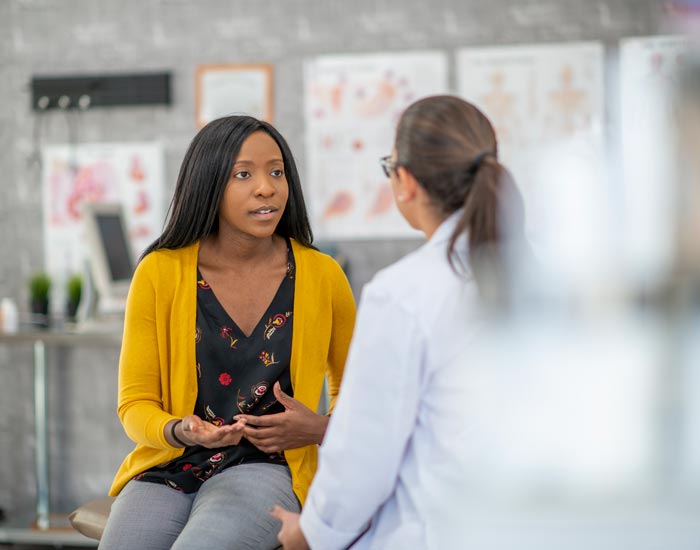UTERINE POLYP TREATMENT IN NEW YORK, NY
We Will Identify and Treat Your Uterine Polyps
Manhattan Reproductive Surgery Center is New York’s premier ambulatory surgical center focused on reproductive surgery. Our staff of medical experts is adept at treating all types of gynecological conditions, including uterine polyps. Led by Founder and Medical Director George D. Kofinas, we strive to deliver an exceptional, private experience. We use state-of-the-art medical equipment in a comfortable environment to diagnose and treat your issues. If you suspect you have uterine polyps or want to learn more, call our friendly team today. We will explain what uterine polyps are and detail our treatment options for you.
Understanding the Causes of Uterine Polyps
Uterine polyps – also known as endometrial polyps – are overgrowths of the inner lining of the uterus. They can range in size from a few millimeters to several centimeters, and there may be one or many. Their exact cause is unknown, but they are usually affected by hormone levels. They tend to grow in response to estrogen circulating throughout the blood. Though most polyps are not cancerous, postmenopausal women are at an elevated risk for cancer, so it is important to see a doctor for treatment. Factors that may increase your risk for uterine polyps include:
- Family history of Cowden syndrome or Lynch syndrome
- High blood pressure
- Obesity
- Use of postmenopausal hormone replacement therapy
- Use of Tamoxifen, a breast cancer treatment

Who Is Affected by Uterine Polyps?
Women in their 50s are at the highest risk for developing uterine polyps. This condition is extremely rare among women younger than 20 years of age, but the risk factor increases steadily with age. After menopause, the incidence rates begin to decline.
Symptoms of Uterine Polyps
It is important to recognize the symptoms of uterine polyps so that you know when to schedule an appointment at Manhattan Reproductive Surgery Center. We treat women from throughout the Greater New York City area, Southern New Jersey, and Connecticut. Let us know if you experience any of the following symptoms of endometrial polyps:
- Irregular or unpredictable menstrual bleeding
- Heavy or prolonged menstrual bleeding
- Bleeding between periods
- Bleeding from the vagina after menopause
- Infertility

Our Team Can Diagnose Uterine Polyps Effectively
At our clinic in the Greater New York City area, we can perform a range of diagnostic tests to determine if you have endometrial polyps. We will review your medical history and risk factors before selecting the test that will work best for you. During each medical exam, our team will ensure you are comfortable and know what to expect. Our diagnostic tests include:
- Curettage – This involves using a metal instrument with a small loop on the end to safely remove a piece of a polyp or the tissue in your uterus for testing.
- Endometrial Biopsy – We will use a small plastic tool to remove tissue from the uterine lining. We will then send that tissue to a lab for testing.
- Hysteroscopy – A doctor can insert a thin, flexible telescope – called a hysteroscope – through your vagina and cervix and into your uterus to observe its lining. During this procedure, we can also use tools to remove any polyps we find.
- Transvaginal Ultrasound – Our staff will put a wand-like device inside your vagina. This instrument will give off sound waves and transmit them to a computer that creates images of the inside of your uterus.
We Will Determine a Uterine Polyps Treatment Plan
There are several ways to treat uterine polyps. The right treatment plan for you will depend on the size of your polyps and how many you have. We will explain your circumstances before coming to a joint decision on how to proceed. Among the treatments for uterine polyps are:
- Medications – We may prescribe medications to regulate your hormones, which will shrink your polyps and alleviate their symptoms.
- Surgery – During a hysteroscopy or curettage, we can remove polyps. Instead of making an incision in your belly, we can insert surgical tools through your vagina and cervix to remove your polyps. We recommend this approach if your polyps are cancerous.
- Observation – If you do not exhibit symptoms and your polyps are not cancerous, you may not need treatment. Some polyps will go away on their own.
How to Prevent Uterine Polyps
Endometrial polyps are not preventable, but you can lower your risk by maintaining a healthy weight and blood pressure. We recommend visiting Manhattan Reproductive Surgery Center regularly to monitor for the development of uterine polyps. Quick treatment will alleviate symptoms and minimize your risk of complications.
Contact Manhattan Reproductive Surgery Center Today
If you experience irregular vaginal bleeding, you may have uterine polyps. The medical professionals at Manhattan Reproductive Surgery Center in Greater NYC can diagnose your condition and provide exceptional treatment to ensure your health and well-being. Contact us today to schedule an appointment.
